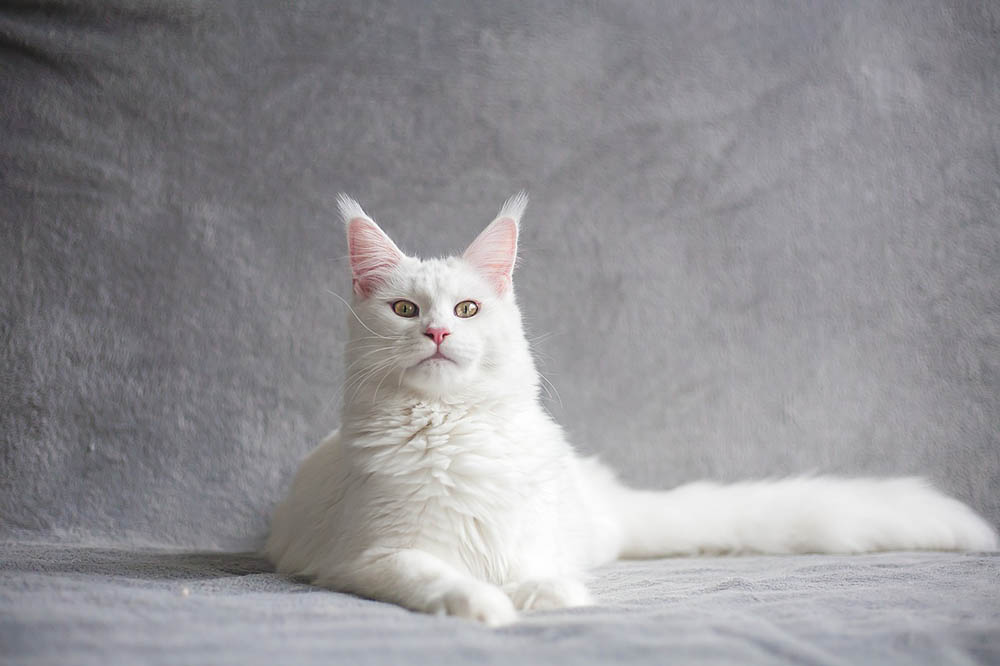Why Is My Cat Biting Her Kittens? 4 Vet-Reviewed Reasons
By Lorre Luther
Updated on
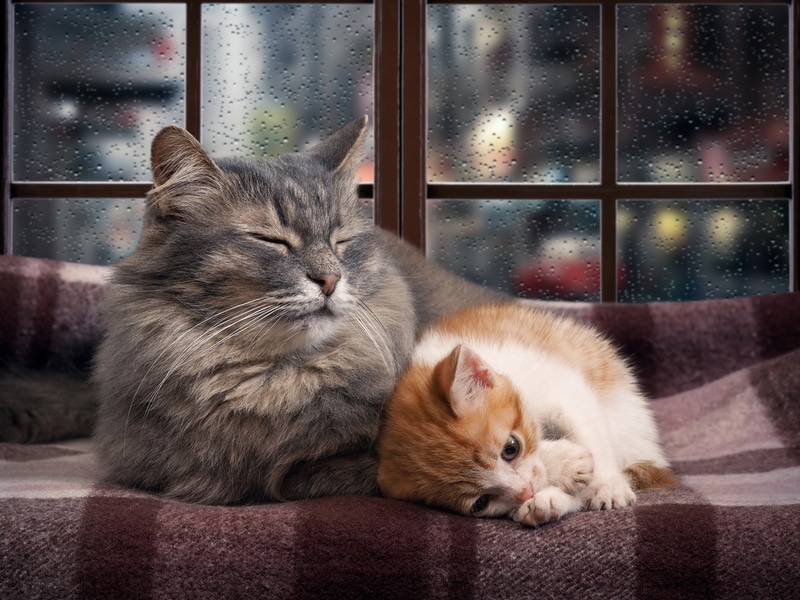
If you’ve seen your cat biting her kittens, you may be wondering if it is normal or if you should be concerned. It depends on the surrounding circumstances, as there can be several reasons that cats bite their kittens.
It can be simple scruffing behavior, or your cat could be giving her babies a grooming assist. However, queens who are particularly stressed can exhibit aggression towards kittens they’re rejecting. Keep reading to learn more about four common reasons your cat may be biting her kittens.
The 4 Reasons Your Cat Is Biting Her Kittens
1. Scruffing
Mother cats often grab their kittens by the loose skin on the backs of their necks when they need to be moved. If your cat is biting the back of her kittens’ necks as part of transporting her babies from place to place, it’s more than likely scruffing, and it’s normal.
Kittens lose the reflex that prompts them to relax when scruffed as they age, and mother cats generally stop scruffing kittens once they can get around reasonably well on their own.
2. Cleaning
Mother cats care for all their babies’ needs in the first weeks of their lives, including keeping them clean. Mother cats groom kittens to keep them tidy and stimulate them to pee and poop. Gentle nibbling is a firmly entrenched part of social grooming.
Kittens start figuring out the basics of grooming themselves when they’re just a few weeks old and can generally take care of their own needs, including going to the litter box and bathing themselves by the time they reach 8 weeks old.
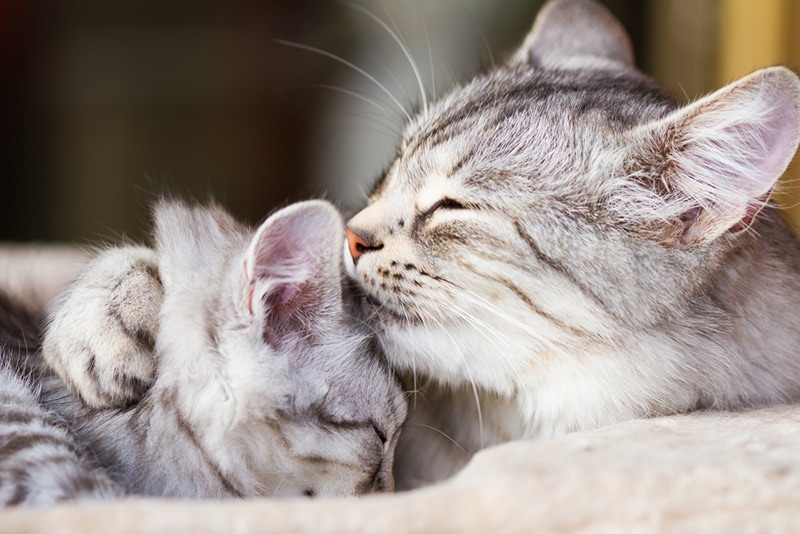
3. Communicating
Kittens absolutely love to explore. They’re little bundles of adorable energy who are sweetly excited by their first tastes of the world. But all that delightful enthusiasm can sometimes become too much for overwhelmed cat mothers responsible for teaching their babies how to interact in feline society.
Cat mothers sometimes dole out quick nips intended to nicely but firmly communicate, “Enough, little one,” much like grown cats gently nip humans to emphasize the importance of responding promptly to requests for things like dinner.
4. Stress
Overwhelmed queens sometimes demonstrate aggressive behavior towards kittens if they become anxious after they give birth. Common stress triggers include noisy, chaotic environments and pain. Warm, quiet places allow cats to feel comfortable and safe during labor and in the early weeks of kittens’ lives.
These issues are commonly seen in younger, more inexperienced mothers. Contact your veterinarian for guidance if you suspect your cat is becoming overwhelmed and appears to be having trouble caring for her kittens or nursing.
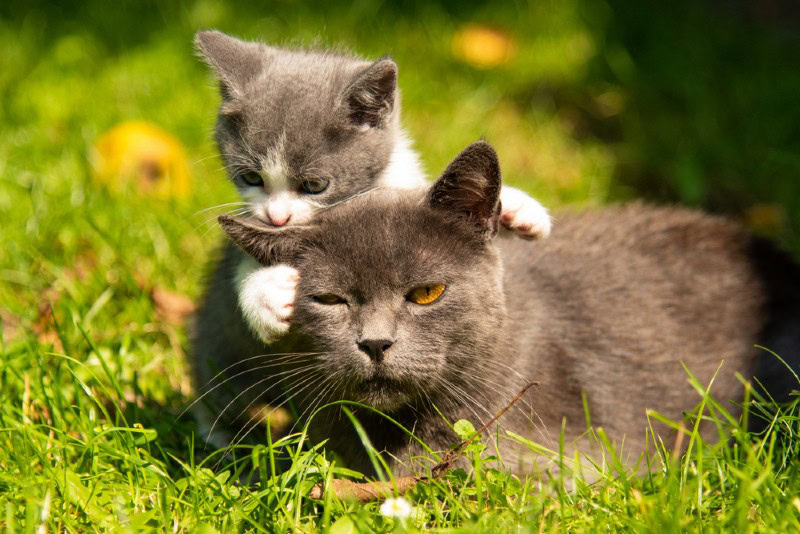
Why Do Mother Cats Reject Kittens?
Queens can reject kittens with physical problems or when they don’t have enough milk to feed a particularly large litter, resulting in some kittens becoming weak and rejected. Mother cats can also stop caring for kittens when overwhelmed or if they’re not feeling well after giving birth.
Cats often put rejected kittens outside of the nest and can react aggressively toward the ones being excluded. Reach out to your veterinarian if any of your kittens appear to be having difficulty gaining weight or have been rejected.
How Do Mother Cats and Kittens Communicate With Each Other?
Kittens can’t see or hear when born, so they rely primarily on smell to identify their mothers and littermates. Adult cats use scent to navigate the world and identify people, other cats, and even familiar places, so it makes sense for kittens to start life relying on this core sense.
It also appears that kittens can recognize their mothers’ voices. Adult cats can also identify the sound of their favorite human’s voice. Kittens’ full hearing and vision abilities usually kick in when they’re around 6 weeks old. Cats have amazing hearing and can rotate their outer ears close to 180 degrees to track down sounds.
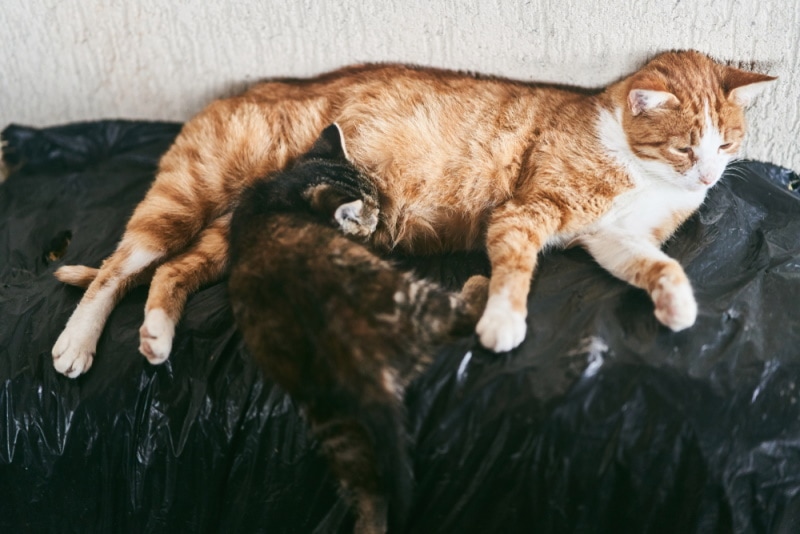
FAQ’s
How many kittens do queens usually have per litter?
Queens generally average between 3 and 5 kittens per pregnancy, but first-time mothers often carry fewer kittens.
When can cats be spayed after giving birth?
Speak with your veterinarian to determine the best timing for your cat and kittens. Cats can go into heat relatively quickly after giving birth, so you don’t want to put things off too long, but there are also drawbacks to spaying cats who are still nursing, and it often takes 4 to 6 weeks for kittens to move entirely to solid food.
How long is kittenhood?
Kittenhood officially lasts about 1 year, but many cats keep growing for a bit longer, and some giant cats require a few years to grow up. Many felines need about 2 years to start behaving like their adult selves.

Conclusion
Cats bite kittens for various reasons, and it can be a gentle way of getting tiny cats who can’t move very efficiently from one place to another. Gentle nibbling is sometimes involved in cleaning kittens and encouraging newborns to go to the bathroom.
Cats regularly employ gentle nips to let people and other pets know when it’s time to take a break, and mother cats sometimes use the form of communication in a similar vein with their kittens. Queens who are highly stressed can sometimes react with aggression toward their kittens. Contact your veterinarian for advice if you suspect your cat has trouble adjusting to motherhood or rejecting one of her kittens.
Featured Image Credit: Irina Kozorog, Shutterstock




